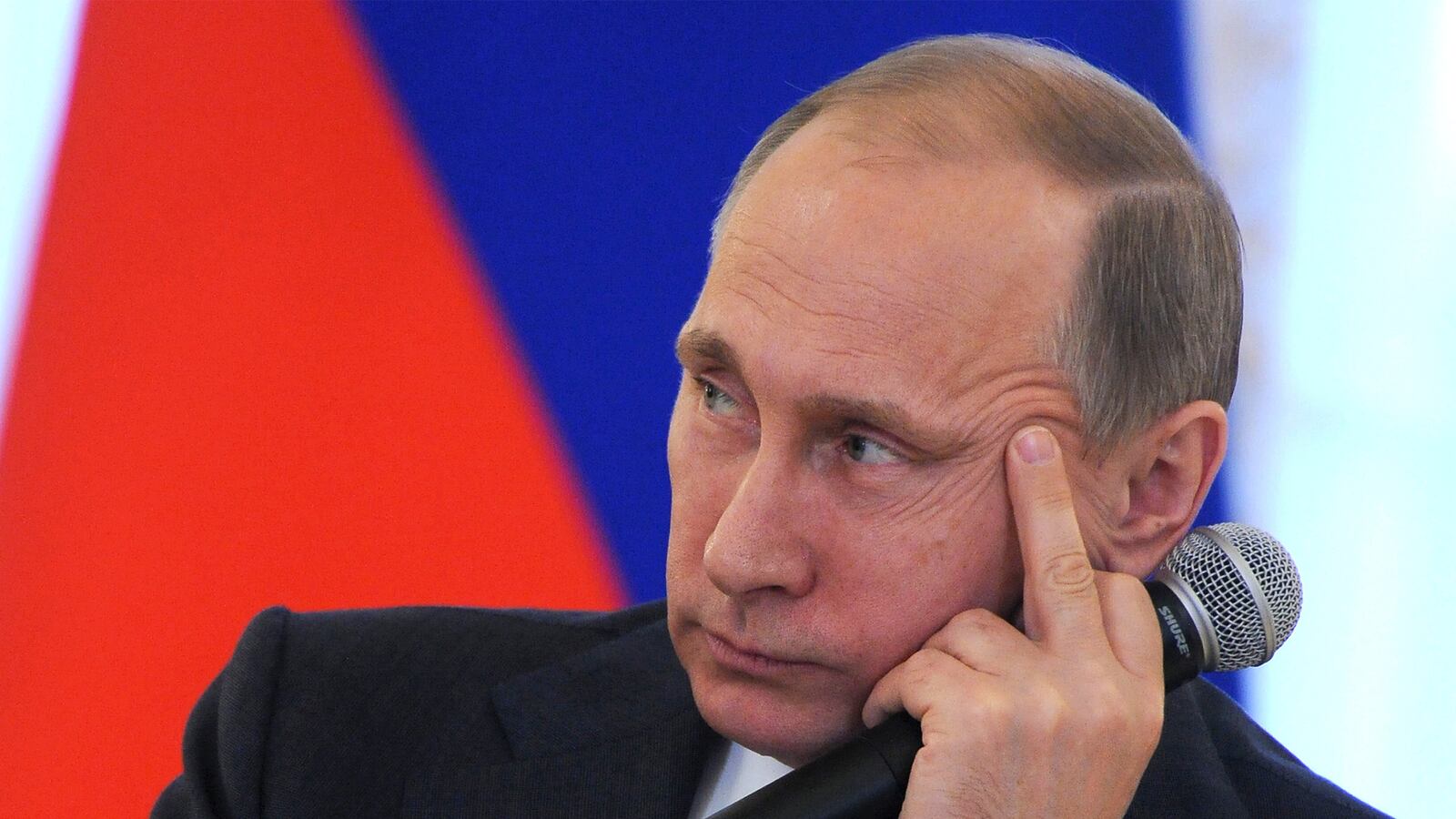Chechen strongman Ramzan Kadyrov invited a few friends to celebrate his capital city, Grozny, and his own birthday on Monday. Among them were the leader of Russian-annexed Crimea, Sergei Aksyonov, and the Afghan warlord Abdul Rashid Dostum. They pushed a button that sent aloft huge jets of water—supposedly “the world’s biggest fountain”—illuminated in brilliant colors. And that might have seemed benign enough.
But there was about the scene, many viewers thought, an uneasy sense of foreboding—the kind of thing some historian of the future will use to crystallize a moment that leads to disaster, like, say, the opening of Barbara Tuchman’s The Guns of August, about the beginning of World War I. It starts with the spectacular royal funeral of England’s Edward VII in 1910, noting in hindsight that the event marked the sunset of one historical era and the beginning of horrible unknowns. As one participant wrote: “All the old buoys which have marked the channel of our lives have been swept away.”
What bothered many independent observers and commentators in Russia was that Kadyrov had another much less benign occasion than his birthday to mark: Earlier this month he had said that if Moscow let him send his militias to Syria, “Then we’d celebrate.” On Monday the Russian Duma acknowledged that Russian “volunteer soldiers” would go to war in Syria. So Kadyrov will have a chance to show off what the 20,000 well-trained soldiers in his militia can do.
The message of Kadyrov and the official pro-Kremlin press was relatively simple, and not unlike the refrain of the Bush administration more than a decade ago: “We’re fighting the terrorists over there so we don’t have to fight them here.” Or, as Vladimir Soloviyov, a leading commentator on Rossia-1 TV, told his audience, Syria is less than 1,000 kilometers from the Russian frontier: “This is not some faraway conflict. Once finished with Syria, Islamists will come after us.”
Even Russian audiences with little idea what jihad might mean, and virtually no concept of Shia versus Sunni, much less the Alawite Assad regime versus the self-proclaimed “caliphate,” could grasp that basic idea.
But as Russia puts more soldiers’ boots on the ground and more warplanes in the air, the Kremlin has created serious tensions with several countries.
On Monday Russia angered NATO by violating Turkish airspace twice. NATO condemned Russia for “the extreme danger of such irresponsible behavior.” Turkish President Recep Tayyip Erdogan said Russia's bombing campaign in Syria was a “grave mistake,” that Putin’s strategy was unacceptable for Turkey.
The potential risks to Russia came out only in the independent media. Over the weekend, radio and online discussions were devoted to the historical preambles that led up to global conflagrations: World War I, World War II, relating them to the potential consequences of the current airstrikes in Syria.
The radio station Echo of Moscow invited historians, journalists, and politicians to comment on a joint statement by France, Germany, Qatar, Saudi Arabia, Turkey, Britain, and the United States calling on Russia to stop bombing Syrian rebels and focus airstrikes on the so-called Islamic State, or ISIS.
Satirist Victor Shenderovich said he was convinced that the Kremlin needed the Syria news as an opiate for the masses, to make the public forget internal issues. “War in Syria is a perfect picture: explosions, airplanes,” said Shenderovich. “These are very exciting scenes to watch: Our MiG and Su planes bombing everything makes people feel a bit more confident about their attitude to life, so that they do not want to check what they have in the fridge.”
Vladimir Ryzhkov, a politician and historian, told The Daily Beast that “to prevent World War III, it is important to understand the mechanisms of escalation, of mistrust in conflicts—without understanding the mechanisms, we won’t be able to avoid the repetition of historical events.”
Russians have been concerned for generations about a potential nuclear conflict with the United States—the older generation has a vivid memory of the Cold War threat, and nobody wants a nuclear disaster.
“Russian politicians have a strong inferiority complex up against the United States, which was partly compensated for by the Crimea operation and military exercises with China,” said Ryzhkov. “That is a psychological compensation and hopefully a prophylactic preventing World War III.”
Russian political analyst Yulia Latynina doubts that the intelligence union of Iraq, Iran, Syria, and Russia will be successful. “We got involved in a war that even theoretically cannot bring us any victory,” Latynina said on Echo of Moscow.






